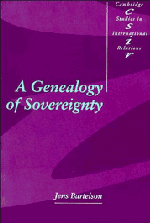Book contents
- Frontmatter
- Contents
- Preface
- 1 Introduction: sovereignty and fire
- 2 The problem: deconstructing sovereignty
- 3 Beyond subject and structure: towards a genealogy of sovereignty
- 4 Inventing outsides: proto-sovereignty, exempla and the general theory of the state in the Renaissance
- 5 How policy became foreign: sovereignty, mathesis and interest in the Classical Age
- 6 Reorganizing reality: sovereignty, modernity and the international
- 7 Conclusion: the end of sovereignty?
- Notes
- Bibliography
- Index
- CAMBRIDGE STUDIES IN INTERNATIONAL RELATIONS
7 - Conclusion: the end of sovereignty?
Published online by Cambridge University Press: 03 May 2011
- Frontmatter
- Contents
- Preface
- 1 Introduction: sovereignty and fire
- 2 The problem: deconstructing sovereignty
- 3 Beyond subject and structure: towards a genealogy of sovereignty
- 4 Inventing outsides: proto-sovereignty, exempla and the general theory of the state in the Renaissance
- 5 How policy became foreign: sovereignty, mathesis and interest in the Classical Age
- 6 Reorganizing reality: sovereignty, modernity and the international
- 7 Conclusion: the end of sovereignty?
- Notes
- Bibliography
- Index
- CAMBRIDGE STUDIES IN INTERNATIONAL RELATIONS
Summary
In this book, I started out by turning a question of being into a question of knowing. Instead of asking what sovereignty is, I asked what happens when one tries to answer this question; instead of posing a question which would merely invite yet another political metaphysics, I tried to circumvent the question of being by investigating the relationship between sovereignty and knowledge logically as well as historically, as it has manifested itself in political and philosophical discourse since the Renaissance. In this chapter I will summarize the outcome of this investigation.
The contingency of sovereignty
In chapter 1, I started by saying what a history of sovereignty would not look like, and the rest of this book has been an attempt to justify these destructive remarks, both through philosophical argument and through historical narrative. As I hope now stands clear from chapter 2, a history of core political concepts based on a prior conceptual analysis must indeed fail, and this for two reasons. First, since conventional conceptual analysis seeks to isolate a stable relationship between the meaning and reference of a given term, it runs into severe problems with sponge concepts such as sovereignty, since their very centrality is conditioned by their ambiguity, and conversely.
- Type
- Chapter
- Information
- A Genealogy of Sovereignty , pp. 237 - 248Publisher: Cambridge University PressPrint publication year: 1995
- 1
- Cited by



